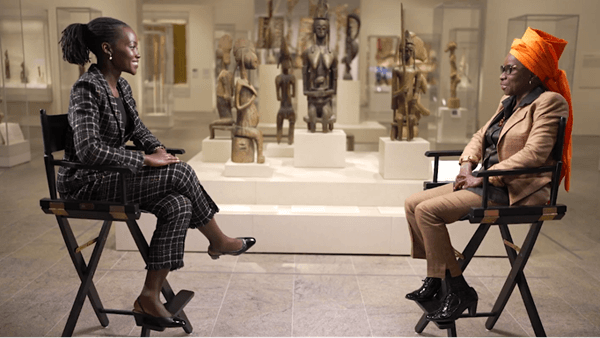In a special episode of Inside Africa, celebrating the series’ 25th anniversary, Academy Award-winning actress Lupita Nyong’o and Grammy Award-winning singer-songwriter Angélique Kidjo reflect on identity, representation, and the power of telling their own stories.
For a quarter of a century, Inside Africa has told the stories of a continent in motion, highlighting the voices shaping business, sport, culture, and change. Nyong’o and Kidjo reflect on how their lives have changed in the last 25 years. Kidjo talks about her journey, “25 years ago, I think I was just arriving in France, running away from a dictatorship, not knowing what the future was going to look like for me and being afraid of what might happen to my parents because I didn’t ask for an authorisation to leave the country. And after the first year, I realised the gift that my parents gave me.”
Nyong’o describes her life 25 years ago, “I was actually living in Mexico; I had left Kenya. I was 17 at this point. So, my parents had sent me to Mexico because I was born there, and they wanted me to learn Spanish. And for me 25 years ago, it was the first time that I realised how much my continent meant to me because I had left it.”
Sitting down at the Metropolitan Museum of Art’s reimagined Arts of Africa galleries in New York City, both women discuss the importance of storytelling. Kidjo explains, “Our stories are in pieces, and we cannot, I think profoundly, we cannot transform our continent if our stories are parcels. How do we make Pan-Africanism a reality, not only in storytelling, but in arts, in economics, in science, in everything. How do we reclaim our own continent if we don’t start by knowing each other’s story?”
Nyong’o has recently launched an award-winning podcast, ‘Mind Your Own’, focused on storytelling and the African diaspora. She tells Kidjo, “I found that it was such an intimate way to change hearts and minds. And I thought, God…I’m homesick. I would love to just be steeped in an African story for a moment. And oral storytelling is such a big part of our culture.”
Nyong’o also talks about how winning an Academy Award for her breakthrough role changed the trajectory of her career, “What’s interesting is that after I won […] I had to be very deliberate about the roles I took on next. So, I ended up having to say a lot of nos, not knowing when my next paycheque was coming […] I had to wait for the opportunities that I felt were deserving of my experience of the accolades I had received. And I continue to have to do that.”
Kidjo says she also faced similar problems, “Especially when you are a black woman in the world of arts, God help you and I mean everything you’re saying, it just gives me flashbacks. When I started my first album, when we were doing the photo shoot for the cover and then brought stylist and then she goes, why are you calling me to dress this woman? She’s African, don’t they walk naked in their countries?”
Nyong’o explains how she adapted her career choices to embrace positive change, “I like to be a joyful warrior for changing the paradigms of what it means to be African. And if that means that I work one job less a year to ensure that I’m not perpetuating the stereotypes that are expected of people from my continent, then let me do that.”
Finally, the two stars sum up what is making them optimistic for the next 25 years. For Nyong’o, “Africa is a very, very young continent. The people are young. And so, I am excited to see what that means for the world to have a very large percentage of the world’s youth coming from the African continent. I am excited for the continued takeover of African music in the world. Definitely. I love that I can go anywhere in the world these days and I will hear an African song without fail a song from the African continent. That is wonderful. It makes the whole world feel more like home.”
And for Kidjo, “This youth that is coming in is another breed. They don’t want none of this past anymore. They know that the past is there, but they want to build a future. And that is something that the youth of this continent, of ours have proven to me over and over again. There is reason to be optimistic.”
See more from Inside Africa:

